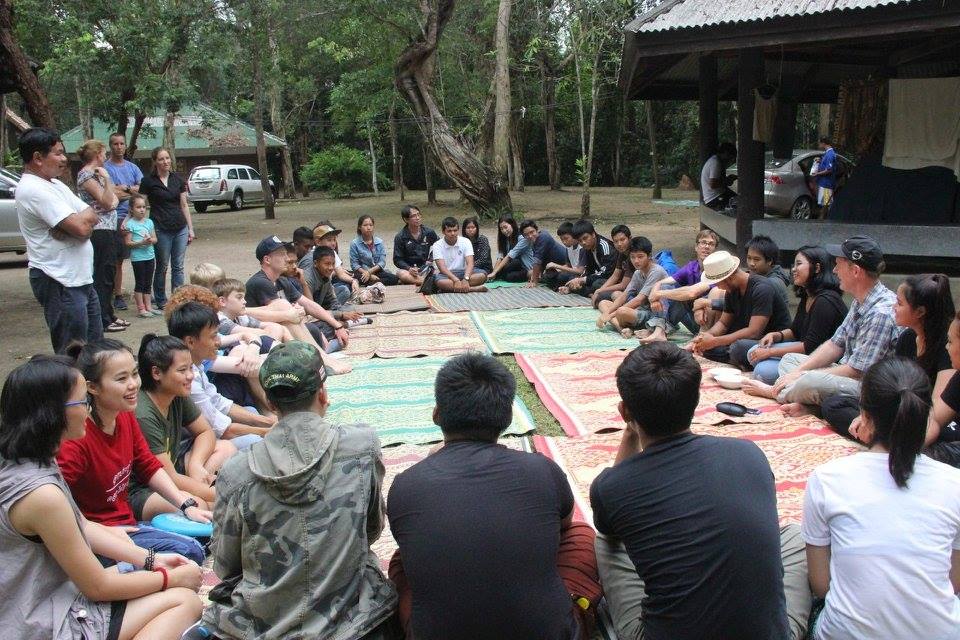 One of the topics that comes up in conversation as we prepare for adventure ministry is “risk”. One of the goals of Adventure Camp is to get the kids to do activities that they perceive as risky. While we always strive to make these activities as safe as possible, we want the campers to feel uncertain about the activities so that they must fight their fears and overcome the challenges they face. Over a number of years, we've seen a number of the young people grow in confidence and willingness to try new things because of the “risky” adventure activities that they have done on camp. For Christians, risk is an important topic as well...
One of the topics that comes up in conversation as we prepare for adventure ministry is “risk”. One of the goals of Adventure Camp is to get the kids to do activities that they perceive as risky. While we always strive to make these activities as safe as possible, we want the campers to feel uncertain about the activities so that they must fight their fears and overcome the challenges they face. Over a number of years, we've seen a number of the young people grow in confidence and willingness to try new things because of the “risky” adventure activities that they have done on camp. For Christians, risk is an important topic as well...
Christians need to be willing to take risks in our personal decisions, in our social interactions and in our use of personal finances in order to be faithful to God and to bring him the glory he deserves. The Bible generally uses the word ”faith” because the risks we take are undergirded by our belief that God desires these actions and he will help and support us as we do them. I think that maybe the word “risk” strikes a better chord these days than “faith” though. It has a grittier, more immediate, emotional impact. Most of us wish to live within our comfort zone, yet God keeps calling us to step out in order to serve him and to show his love to a needy world. There’s an old Steve Camp song that I love. It challenges me to be willing to do all I can for the Lord. The chorus goes like this, “Oh, to gladly risk it all, oh to be faithful to His call / Abandoned to grace yet anchored in His love / Living dangerously in the hands of God”. Hudson Taylor, the founder of CIM-OMF, summed it up perfectly when he said, “Unless there is an element of risk in our exploits for God, there is no need for faith.” May we all be willing to abandon ourselves to God’s grace and live riskily in response to our faith in him.
- Details
- Written by Jeff Callow
- Category: Serving in Mission
- Hits: 998

For the past six or so years, adventure camps have been a core part of the OMF South Thailand ministry. My first one was as a short-termer 5 ½ years ago, with Jeff, and another short-termer and 4 or 5 Thai guys. It was exciting to come back as a long-termer last year and see how much things have grown since then and I find each time God has something to teach me as well. This last camp in April was no different. I was expecting going non-stop for 3 ½ days like the camp before in which I’d had only 10 hours of sleep over 3 nights. But God had other plans...
- Details
- Written by Steve McCallum
- Category: Serving in Mission
- Hits: 866
Our house in Phrom Khiri is near the district office, and recently they held an installation service for a new Buddha statue/idol placed in the front (it is the black statue in the photo). Caleb, our oldest son, was out playing soccer with the other Thai kids in the neighborhood that night, and they wandered over to look at the statue. All the other kids told Caleb to "wai" the statue. Usually the "wai" done with the hands is a form of Thai greeting, but in religious situations it is a form of worship and a sign of respect. An adult also motioned for Caleb to "wai" the idol as well. Would Caleb “wai” or not, and did he understand why he should not?
- Details
- Written by Dave Chang
- Category: Serving in Mission
- Hits: 822

This photo reflects the reality of cross-cultural mission today. Included in this photo are local Christians, a Thai evangelist working with our missionary teams, members of a Korean-American short-term mission team and long-term missionaries. (See if you can pick who is who!) It’s so amazing how God brings people from all over the world to be involved with his work in one small corner of this country in Asia. This shouldn’t be a surprise, because in Acts 13:1 we see a multi-cultural ministry team from all levels of society already serving the Lord together: “Now there were in the church at Antioch prophets and teachers, Barnabas [from Cyprus], Simeon who was called Niger [an African], Lucius of Cyrene [a Greek], Manaen a lifelong friend of Herod the tetrarch [from Judea], and Saul [from Tarsus in modern day Turkey].” (The notes in the square brackets [] are mine.) The photo above doesn’t show all those involved in God’s work here though. There are also mission leaders and administrators located in Bangkok, Singapore and home countries. There are also those who provide prayer and financial support. All of us have a part to play. What’s your part?
- Details
- Written by Jeff Callow
- Category: Serving in Mission
- Hits: 815


